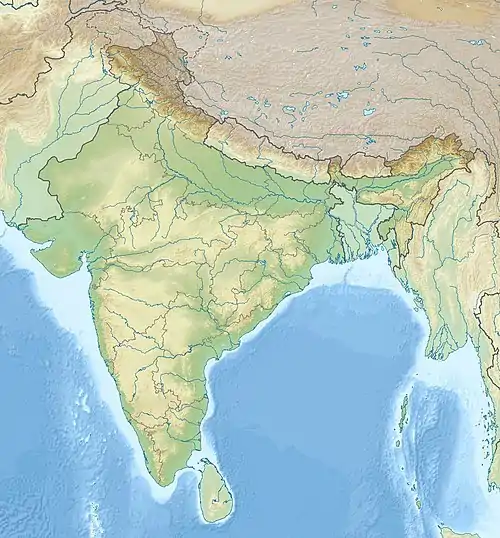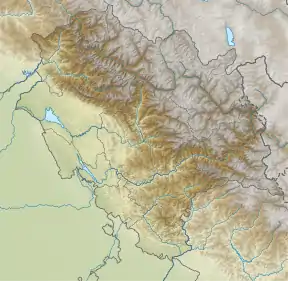| Karcham Wangtoo Dam | |
|---|---|
 | |
 Location of Karcham Wangtoo Dam in India  Karcham Wangtoo Hydroelectric Plant (Himachal Pradesh) | |
| Official name | Karcham Wangtoo Hydroelectric Plant |
| Coordinates | 31°32′35.53″N 78°00′54.80″E / 31.5432028°N 78.0152222°E |
| Purpose | Power |
| Status | Operational |
| Construction began | 2005 |
| Opening date | 2011 |
| Construction cost | Rs. 7,150 crore ($687 million USD 2011) |
| Owner(s) | JSW Group |
| Dam and spillways | |
| Type of dam | Gravity dam |
| Impounds | Sutlej River |
| Height | 98 m (322 ft) |
| Length | 177.8 m (583 ft) |
| Elevation at crest | 1,813 m (5,948 ft) |
| Reservoir | |
| Surface area | 588 m2 (0 acres) |
| Normal elevation | 1,810 m (5,938 ft) |
| Power Station | |
| Commission date | 2011 |
| Hydraulic head | 298 m (978 ft) (gross) |
| Turbines | 4 x 250 MW Francis-type |
| Installed capacity | 1,000 MW |
| Annual generation | 4,560 GWh est.[1] |
The Karcham Wangtoo Hydroelectric Plant is a 1,091 megawatts (1,463,000 hp)[2] run-of-the-river hydroelectric power station on the Sutlej River in Kinnaur district of Himachal Pradesh state of India.[3]
Etymology
The dam and power station are located between the villages of Karcham and Wangtoo where the plant also gains its name.[3]
History
In 1993, and after years of delays, the Jaypee Karcham Hydro Corporation Limited of Jaypee Group signed a memorandum of understanding to develop the dam. On 18 November 2005, the construction on the power station began.[3] In 2015, Jaypee Group sold out Karcham Wangtoo Project to JSW Group.[4]
In May 2011, the first generator was commissioned, the second in June and the final two in September.[5]
Technical details
The 98 m (322 ft) tall dam at Karcham (31°30′00.26″N 78°10′39.54″E / 31.5000722°N 78.1776500°E) diverts a substantial portion of the Sutlej into a 10.48 m (34.4 ft) diameter and 17.2 km (10.7 mi) long headrace tunnel to the underground power station downstream at Wangtoo. At the station, the water powers four 250 MW Francis turbine-generators before it is sent back into the Sutlej via a 1.2 km (0.75 mi) long tailrace tunnel. The difference in elevation between the dam and the power station affords a gross hydraulic head of 298 m (978 ft). Water not diverted by the dam is sent over the spillway and down the normal course of the river. The main spillway is along the crest of the dam and is controlled by six radial gates.[6]
Just upstream of the dam is the 300 MW Baspa II Hydroelectric Plant and downstream of the Karcham Wangtoo is the 1,500 MW Nathpa Jhakri Dam.[3]
Transport
In 2020, construction of a new nearly 150 km long "Karcham-Harsil Road" was announced. It will link Karcham on NH-5 to Harsil on NH-34, both in Himachal Pradesh. This new road, to be constructed by Border Roads Organisation (BRO) at a cost between Rs 2,500 to Rs 3,000 crore, is in addition to the 73 previously approved India-China Border Roads (ICBR). It will cut down present 450 km long distance, which take nearly 16 hours, to just nearly 150 km or 2 to 3 hours. Since Karcham and Harsial are 26 km and 52 km away from the Line of Actual Control (LAC) respectively, the new road will also enable the faster deployment of troop.[7]
See also
- Nathpa Jhakri Dam – situated downstream
- Indus Water Treaty - includes Sutlej river
References
- ↑ "Hydroelectric Power Plants in India - Himachal Pradesh". IndustCards. Retrieved 14 June 2013.
- ↑ Jai, Shreya. "CEA restricts capacity of JP hydro plant sold to JSW". Retrieved 28 May 2016.
- 1 2 3 4 "Hydroelectric Project in Kinnaur District in Himachal Pradesh" (PDF). UN Clean Development Mechanism. Retrieved 14 June 2013.
- ↑ "JSW Energy buys JP Power's 2 hydro projects for Rs 9,700 crore - Times of India". The Times of India. 8 September 2015. Retrieved 28 May 2016.
- ↑ "Karcham Wangtoo Hydroelectric Project". Global Energy Observatory. Retrieved 14 June 2013.
- ↑ "Jaypee Karcham Hydro Corporation Limited". Jalindia. Archived from the original on 1 April 2014. Retrieved 14 June 2013.
- ↑ Modi govt’s infra push along China border — 2 new roads, alternate route to Daulat Beg Oldie, The Print, 15 September 2020.